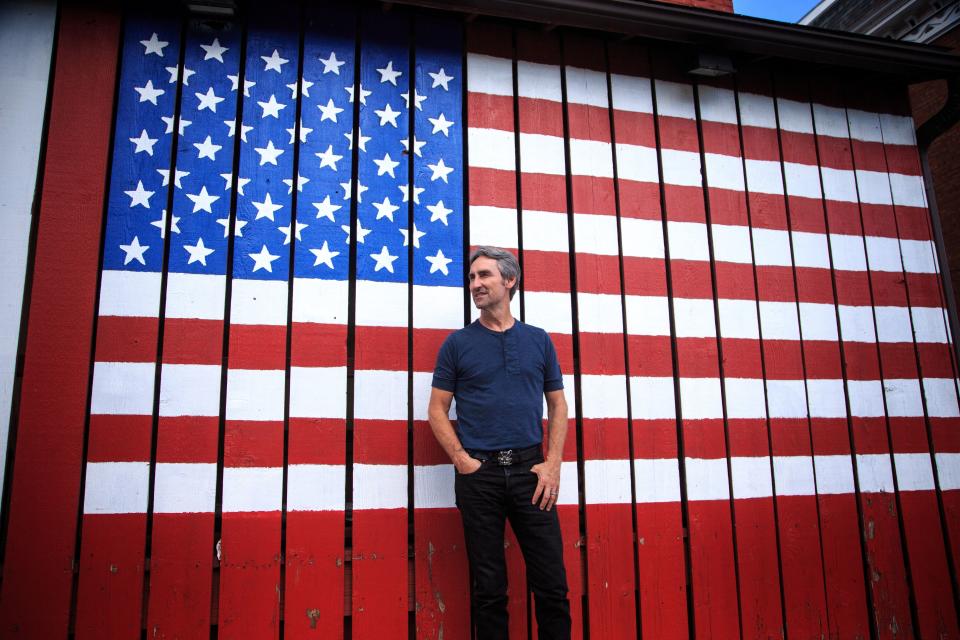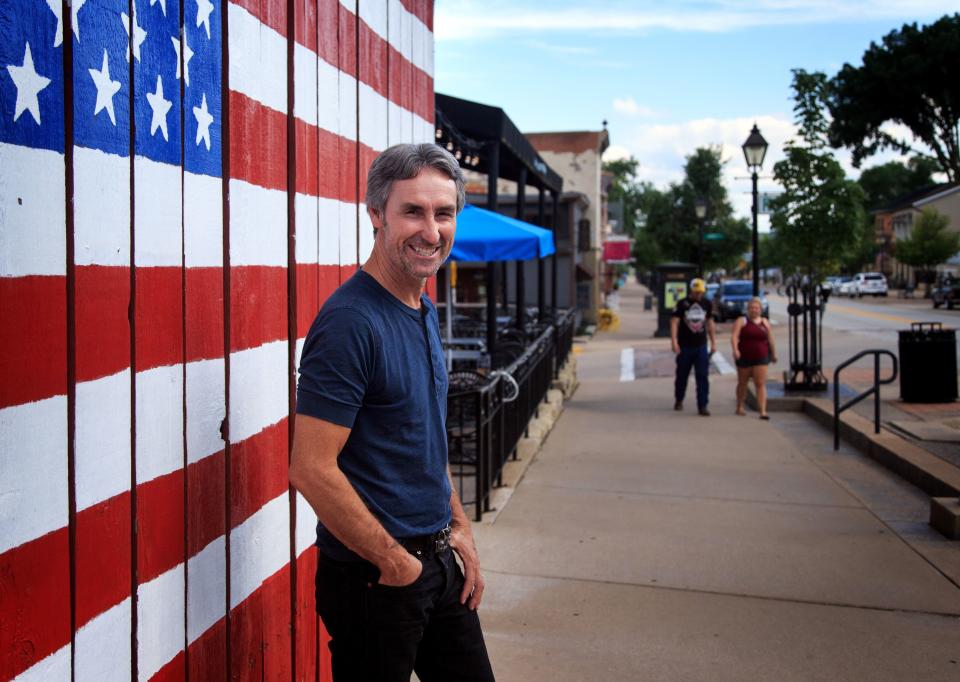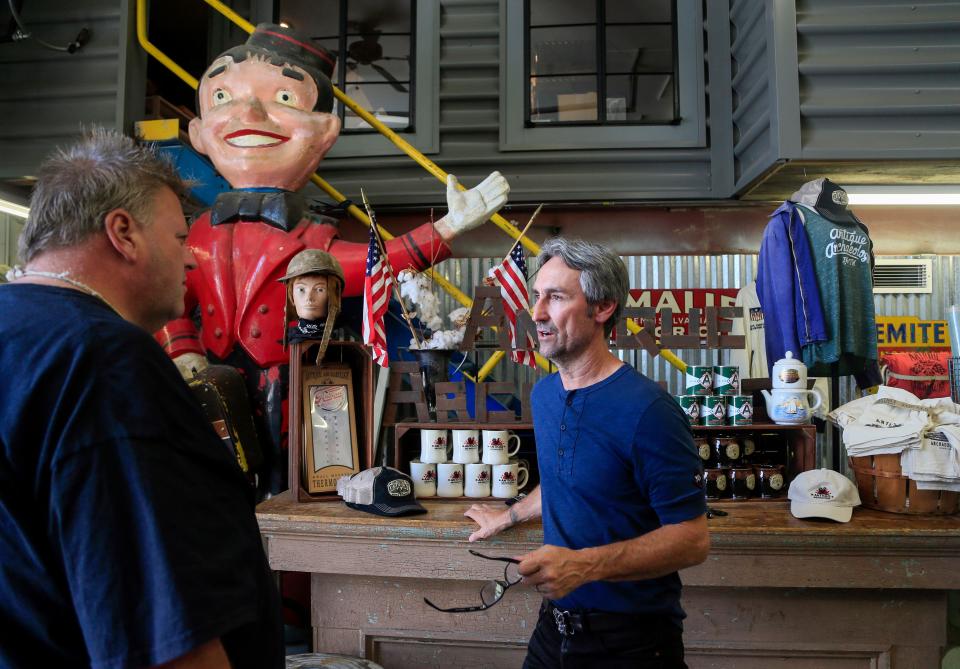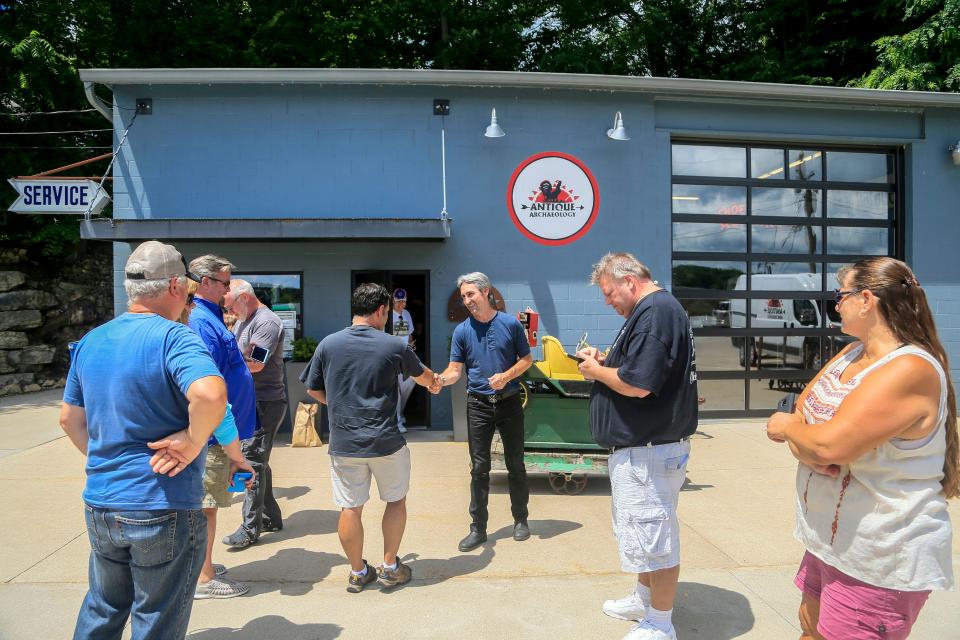Mike Wolfe of 'American Pickers' on rural America and other things worth saving

LeCLAIRE, Ia. — “Why am I here?”
That’s Mike Wolfe’s opening salvo at every farm, corn crib, attic and cellar he visits to sift through junk looking for gems on “American Pickers,” the mega-hit reality show he created and still stars on.
But recently, he’s been asking himself that same question: “Why am I here?”
Sometimes, he means it plainly — with his schedule of two weeks filming on the road for every two weeks at home, he jokes he can forget exactly what he's doing sometimes — but often, it's existential.
How did a kid from a single-parent household in Davenport, Iowa, who barely graduated high school become a millionaire and a celebrity in antiques circles? Where did a listless 20-something carrying around a camera to film himself asking about other people’s trash get the gumption to believe this could be a TV show?

And what about him keeps viewers tuning in after a decade of “Pickers”?
In all that first-person thought, the answer resides decidedly in the third-person. The show has little to do with him or even with the “picks,” as fans call the objects he buys. All that, he says, waving a hand like he’s swatting a fly, is window dressing.
The essence of “Pickers” comes in the answer to his question: “Why am I here?”
“Every object has a story,” he says, holding eye contact. “And that story is reflective of a family, or of a place, or of a time, or of a moment. So it's a show about all of us. It's reflective of all of us.”
It’s also a show about transitions — whether people are dealing with major changes in health, family makeup, finances or even the death of a loved one, Wolfe’s job is to bring positivity and a moment of celebration within that tragedy.
He's up to the task, but when you have hours and hours on two-lane highways to think about the weight of all of it, it gets, well, heavy.
And it gets him to thinking about his own transitions; his own answer to the question he will toss out to 45-episodes' worth of farmers, collectors and hoarders when the new season of “American Pickers” premieres May 20: “Why am I here?”

In his case, the more specific question is: When you have achieved personal and professional success with a show that dominates ratings and has the shelf-life of a Twinkie, what else do you do? And when you love physical history and rural life in a world that prefers images and ideas carried on fiber optic cables and places where dinner is takeout more often than home cooking, how do you keep the past alive?
Walking the streets of his hometown, stopping in his packed store, Antique Archaeology, and munching tacos at his friend’s Mississippi riverfront Mexican joint, he attempted to work those questions out.
“I'm a storyteller, so is it my responsibility to tell that story?” he asks. “I think it is, like, it is big time. (And) the show is at the point now where it's, like, I want to talk about these things that matter.”

Third from the bottom
If you think about life as a road trip — an apt way to describe Mike’s experience, given his time traveling on them — Wolfe knew the route from here to there wasn’t going to be smooth, brightly lit highways. From his earliest memories, he understood that his road to success would require him to machete through overgrowth, lay his own gravel and bring enough provisions to make it through the trip.
As a thin, lanky, poor kid in Joliet, Illinois, and then LeClaire, Wolfe said he was mercilessly picked on, getting jumped to and from school and having milk poured on him in the cafeteria.
In a real-life version of Frogger, Wolfe, now 54, avoided bullies by cutting through yards and alleys to get to school.
“The alleys were safe places for me, and that's where the garbage was, too,” Wolfe says. “And so the garbage became my toys and they became part of my imagination and they became part of who I was.”
Along the way, he made friends with the old men whose garages overflowed with rusty junk, spending hours chatting with them about bygone days. (On that front, not much has changed, he offers.)
“This old man gave me a cigar box and that was, like, everything to me, you know, because of the colors and the way it smelled and the fact he gave it to me,” Wolfe says.
In school, Wolfe couldn’t focus. He’d read textbook pages over and over as though he was interpreting an alien language. But anything he could get his hands on — autos, woodshop — that clicked.
Massive collection of 110 vintage muscle cars revealed in southwestern Iowa ahead of auction
'American Pickers' comes back to Iowa in search of rusty gold
After graduating third from the bottom of his class — a great memoir title, he says — he bummed around some community colleges in the Midwest, taking a few years to realize that his success wouldn’t be tied to a degree.
He worked in a warehouse building bikes in his early 20s before being promoted to the sales floor. His garbage collecting became “picking,” and he kept it up because, he says, “it's hard to sell a bicycle in January in Iowa.”
Before the internet, he picked in the only way he knew how — by knocking on farm doors. He’d spend hours talking to the owner and, sometimes, come away with nothing.
His life was so weird to his friends, and the stories he told were so revelatory, nearly everyone around him would say, “Wow, you should be on a TV show.”
After hearing it enough times, Wolfe decided they might be on to something.
Think Bourdain, but about junk
In the fall of 2009, Mary Donahue was part of a new era at the History channel. “Ice Road Truckers” had already upended the World War II documentary-focused network of the late ’90s, but Donahue was looking for a program that would meld old History with new History.
“When I joined History, our log-line was ‘History Made Every Day,’” Donahue said. “History channel has never been just about the past. It's also about the present and, more importantly, the living, breathing, exciting reminders of our past in our present day.”
Into this search arrived a “charming” tape of Wolfe, who had for five years been taking selfie videos while driving around southeast Iowa, knocking on doors in the country.
During the recession, a tsunami of junk-selling shows hit the airwaves as people hoped their attics held an unknown Monet or a Warhol that would make them an overnight millionaire. But those shows had two things in common:
They took place in a set, standard location (think: pawn shop or convention center), and
They featured expert-level, academic-focused analysis of said trash.
On this tape were a guy and his best friend — Frank Fritz — who had street-wise knowledge paired with razor-sharp gut feelings, road-warrioring for finds through the Midwest. To top it off, they were warm and funny, Donahue said.
“What we really enjoyed was that it was outside of the shop and that Mike and Frank were traveling through parts of America that felt really fresh to us,” she said.
After five years of pitching, Wolfe was happy to hitch his star to any network, but History provided a perfect opportunity to focus on story and place — not just the final sale.
He dreamed of a show about objects that felt like Anthony Bourdain’s culinary programs. He hoped to mimic how Bourdain’s show was a story of region, culture, economy, trends and lifestyle, but wrapped in a patina of soy sauce and served as though it was all about food.
The stuff he found would simply be the vehicle to talk about everything else.
And so it has been for the past decade. Though Wolfe keeps hundreds of notes on his phone about what they can do better, the show today remains very similar to what it was when it premiered in January 2010.
They’ve cut back on what Wolfe calls “saved by the bell” moments, or artificial scene-setting like when he calls shop operator Danielle Colby for a lead and she just happens to have one right on her computer screen.
And they’ve made the decision to follow some of Wolfe’s real-life pursuits, including his new store in Nashville and his search for a specific American-made, porcelain sign for his LeClaire store, which he says, standing abruptly, we should go look at.
We’ve been sitting for three hours by now and for Wolfe’s on-the-move lifestyle, that is quite enough.
A legacy
Outside of his Iowa store, Wolfe is a rock star. Walking the 20 feet from his car to the front door is a 20-minute trip filled with selfies, autographs and tales of favorite picks. Most people have driven up from Davenport, their main stop on wherever they are headed, but some have come here, particularly, from as far away as New York and Arizona.

Wolfe is gracious and kind to each person, knowing how to make them feel like the center of his world, if only for 30 seconds.
Creating this — a hive of activity in a small town off a major highway — in every small town is what the mission of his show has evolved into.
In LeClaire, Wolfe was part of a revitalization, helping the town build a successful tourism industry based off being both the hometown of Buffalo Bill and a riverboat stop along the Mississippi River.
Other towns, he understands, are not as lucky.
“When we lose small towns, we lose everything that we stand for,” Wolfe says. “We lose small business. We lose entrepreneurs. We lose historic properties. We lose pride. We lose jobs.”
But he also deeply believes turnarounds can happen, especially if towns embrace and publicize whatever makes them special. He’s part of the Preserve Route 66 campaign, publishes a blog about stores and eateries in Small Town U.S.A. and is helping to renovate the rural community he lives in outside Nashville.
On the show, he is slowly trying to feature more of the towns where he does picks, highlighting not just the story of the people or the object, but the place where they live.
“I chose a pick in Kansas to tell this guy's story for the sole purpose that we're talking about right now,” Wolfe says. “Young guy, 35, had an antique car business in the middle of nowhere, Kansas. How did it survive? Online sales. Ninety percent of his stuff for sale is online.”
“He could be on the moon and he’s selling stuff!”
With that, Wolfe joins the siren call of those asking millennials to think of Brownsville, Texas, or Boise, Idaho, instead of Brooklyn: Cheap living! Simple lifestyle! Historic buildings!
“This is the thing that's going to save America's Main Street — are these younger people that understand how important online sales are,” Wolfe says. “If they understand that and they have a business that connects to that, they can be anywhere.”
Wolfe loves his job, but each new season offers a small reminder of mortality, he says, pointing out that his mop top has literally turned gray on TV.
So, on his long two-lane trips, he’s starting to think about legacy in a bigger way.
How he can tell the right story, he asks, the one that will make people care about permanence in a culture focused on the fleeting? How he can reach at least one person who decides to move their online business back to their hometown; or another who donates their grandparents’ heirlooms to a local museum instead of knocking down the family homestead with everything in it; or someone else who lets an interested kid picking through the trash take that cigar box instead of telling him to get off his lawn.
He’s not a politician and he doesn’t have Bill Gates money, but he’s got a TV show with a platform.
Figuring out how to not squander that is why he keeps asking himself: "Why am I here?"
This article originally appeared on Des Moines Register: Mike Wolfe of 'American Pickers' on rural America and other things worth saving

